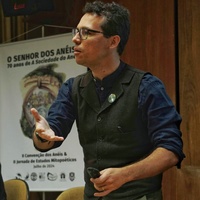
ana donnard
THE ESSENCE OF HEREDITY IS SEMIOTIC SURVIVAL
less
Related Authors
Erick . Carvalho de Mello
UNIRIO - Universidade Federal do Estado do Rio de Janeiro
Cristine Wöhl
FURB - Fundação Universidade Regional de Blumenau
José-Martinho Montero Santalha
Universidade de Vigo
Erik Wroblewski
Universidade Federal do Paraná
Adriana Zierer
Universidade Estadual do Maranhão
José Freire
Universidade do Porto
InterestsView All (12)









Uploads
Papers by ana donnard
MOTS-CLÉS: celtologie; mythologie celtique; l'Autre Monde; île Brasil; narratives de voyage.
Followers (0)
Celtic literature and Celtic history can be considered as 'terra incognita' in Brazil. Nevertheless, many aspects of a Celtic nature can be identified in Brazilian culture. Bretons, Galicians and Portuguese
shared a common space in Europe’s extreme western point, being the Oestrymnios people to the ancient Greeks. The Bretons, whether they had come to Brazil to trade or as missionaries, were known only as French, and the Galicians as Spanish. But their Celtic lore has come with them and if we look towards Portuguese lore it will not be difficult to recognise elements that have common roots
in Celtic oral literature and Celtic medieval written literature. The oral culture from the Sertão, especially in the region of the São Francisco river could certainly give us much important material not yet collected. This is an enterprise that still has to be undertaken, before this people’s voices finally
become silent.
KEYWORDS:
BRETON ORAL LITERATURE, SERTANEJA CULTURE, BRAZIL COLONISATION HISTORY, CULTURAL IDENTITIES,
CELTIC FOLKLORE
MOTS-CLÉS: celtologie; mythologie celtique; l'Autre Monde; île Brasil; narratives de voyage.
Followers (0)
Celtic literature and Celtic history can be considered as 'terra incognita' in Brazil. Nevertheless, many aspects of a Celtic nature can be identified in Brazilian culture. Bretons, Galicians and Portuguese
shared a common space in Europe’s extreme western point, being the Oestrymnios people to the ancient Greeks. The Bretons, whether they had come to Brazil to trade or as missionaries, were known only as French, and the Galicians as Spanish. But their Celtic lore has come with them and if we look towards Portuguese lore it will not be difficult to recognise elements that have common roots
in Celtic oral literature and Celtic medieval written literature. The oral culture from the Sertão, especially in the region of the São Francisco river could certainly give us much important material not yet collected. This is an enterprise that still has to be undertaken, before this people’s voices finally
become silent.
KEYWORDS:
BRETON ORAL LITERATURE, SERTANEJA CULTURE, BRAZIL COLONISATION HISTORY, CULTURAL IDENTITIES,
CELTIC FOLKLORE